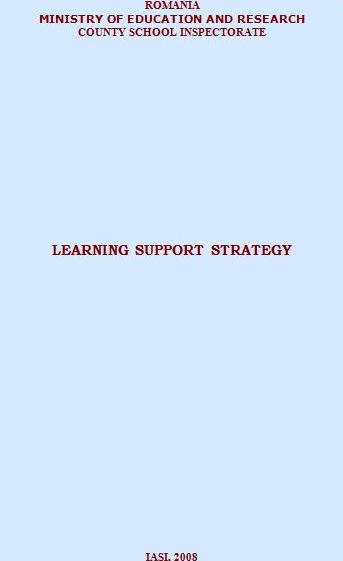Database of Publications


Learning Support Strategy
Teacher Camelia GAVRILĂ, PhD - General School Inspector
Teacher Aura Ţabără, sociologist - Inspector of Continuous Training
Teacher Coca - Marlena Vasiliu - Inspector of Special Education
Teacher Maricica Buzescu, psychologist – C
Ministry of education and research and County school inspectorate
Iasi, 2008
Research, Report
English
English
There is much talk today about “new educations” and about the necessity to link these educations in such a way that formal education should use the advantages offered by the non-formal and informal education up to the maximum.
The relationship between the non-formal and formal education is one of complementarity, as results from the analysis of the contents, ways and forms of achievement.
One of the most important indicators of an educational system’s efficiency is the school dropout rate. This reveals the capacity of the school system to integrate and keep the students within, to ensure access and support in order for them to finalize at least the compulsory school level.
Content of the report:
I. School dropout – a phenomenon of the Romanian and European education system
II. School dropout – a problem the County School Inspectorate Iaşi has in view
II.1. The analysis of the early school leaving dynamics in the period 2000-2007
II.2. The causes of school dropout in Iaşi County
III. Intervention measures and their impact on reducing early school leaving
III.1. Intervention measures carried out in the period 2000-2007
III.2. Learning support strategy
A. Opinions of the stakeholders implied in organizing and developing extracurricular activities
1. Opinions of the teachers
2. Opinions of the County School Inspectorate
3. Opinions of the NGOs representatives
B. Correlations between the opinions of the factors involved in the organization and carrying out of extracurricular activities
IV. Conclusions
V. Suggestions and recommendations
Non-formal activities have a formative influence from a multi and interdisciplinary perspective, prone to develop the democratic spirit, the interest for social and political life, the concern for the economical resources and protection of the environment. The formative value of the action of spontaneous stimuli, specific to informal education, can raise through the diminution or cancellation of their contradictory character, through correlated action of all the factors and of social, non-school institutions, which could benefit, at all times, from the teachers’ competence which provides formal education to students.
Andreea Cleminte
Fundatia EuroEd
partner
Zone d'identification

4 mars 2013
Lancement du Module 5 “Soutien externe et coopération”
Au cours du mois de mars 2013, les partenaires forment les enseignants impliqués dans le projet au Module 5 "Soutien externe et coopération". Le module examine les ressources et soutiens externes pour les enseignants et élèves pour les aider à prévenir le décrochage scolaire.

School Inclusion - Copyright 2008 - Ce projet a bénéficié du soutien financié de la Commission européenne